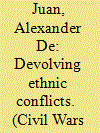| Srl | Item |
| 1 |
ID:
119721


|
|
|
|
|
| Publication |
2013.
|
| Summary/Abstract |
Institutions can contribute to regulating interethnic conflict; however, in many cases, they fail to bring about lasting peace. The article argues that the negligence of subgroup identities accounts for some of this failure. Ethnic groups are often treated as unitary actors even though most consist of various linguistic, tribal, or religious subgroups. When interethnic conflict is settled, subgroup differences may come back to the fore. This 'resurgence' can lead to subgroup conflict about the political and economic resources provided through intergroup institutional settlements. This can in turn undermine the peace-making effect of intergroup arrangements. Different subgroup identity constellations make such destructive effects more or less likely. The article focuses on self-government provisions in the aftermath of violent interethnic conflict and argues that lasting intergroup arrangements are especially challenging when they involve 'contested' ethnic groups.
|
|
|
|
|
|
|
|
|
|
|
|
|
|
|
|
| 2 |
ID:
145701


|
|
|
|
|
| Summary/Abstract |
Bridging social ties is thought to reduce the likelihood of interethnic violence. This logic has motivated countless development projects and international programs seeking to forge cross-group ties between groups with a conflictual history. However, this article identifies an important mechanism by which certain cross-group ties can make interethnic peace strictly less likely. The results stem from a game-theoretic model which formalizes civil society as a network and relates intergroup cooperation to the particular networks that transmit information from person to person in each group. The model reveals that, first, groups are capable of enforcing cross-group cooperation, even when no cross-group ties are present and the networks within each group are missing links, using peer-enforcement strategies, and their ability to do so depends on the structure of these networks. Second, when attempting to enforce intergroup cooperation, groups with sparse networks may be at risk of a long-lasting series of back-and-forth retaliation that groups with denser networks would avoid. Finally, there exists a mechanism by which some cross-group ties make intergroup cooperation strictly less likely. When interethnic cooperation is enforced by threatening coordinated retaliation for any misbehavior, success depends on expectations about how quickly retaliation can be coordinated and how many will participate in it. Some individuals in a network are in a position to send news to many others quickly; others are not. The latter therefore coordinate retaliation more slowly and would be relatively vulnerable to cross-group defections if they could be identified. Cross-group ties expose the vulnerability and generate incentives to disrupt interethnic peace; cross-group ties between the least embedded individuals in each ethnic group are the most dangerous. Programs seeking to impose ties should avoid exposing this vulnerability without taking steps to mitigate its danger.
|
|
|
|
|
|
|
|
|
|
|
|
|
|
|
|